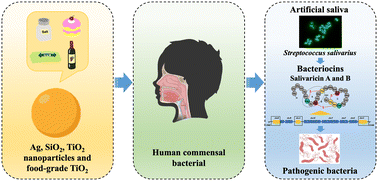Food-related engineered nanoparticles and food-grade TiO2 impact the metabolism of a human commensal bacterial strain in physiologically relevant conditions†
Abstract
Considering the widespread application of nanotechnology in the food industry, humans are increasingly exposed to food-related engineered nanoparticles (NPs). Upon ingestion, NPs come into contact with human commensal bacteria that play an important role in human health and disease. Therefore, the effects and biotransformation of food-related NPs in the digestive tract, including microbiota, need to be assessed. Herein, artificial saliva was used as a physiologically relevant test medium to investigate the effects of Ag, SiO2 and TiO2 NPs and food-grade TiO2 on the growth and antagonistic activity of Streptococcus salivarius K12, a human beneficial bacterium inhabiting the oral cavity, and bacterially induced biotransformation of NPs. SiO2 NPs, TiO2 NPs and food-grade TiO2 at concentrations up to 100 mg L−1 did not affect the growth of S. salivarius K12, while Ag NPs were expectedly growth-inhibitory already at 10 mg L−1, both in aerobic and anaerobic conditions. At sub-growth-inhibitory concentrations, NPs and food-grade TiO2 significantly modified the transcription of structural genes (salA and sboA) of two bacteriocins (salivaricins) in S. salivarius K12 genome, signal transduction gene (sboK) and bacteriocin immunity conferring gene (sboG, an ABC transporter). Changes in gene expression were accompanied by the increased antagonistic activity of the bacterial strain. Spent artificial saliva, where bacteria had been cultured, markedly affected the transformation of NPs compared to fresh artificial saliva. The transformations included significant agglomeration, increased dissolution of Ag NPs and enhanced bioavailability of SiO2 NPs, TiO2 NPs and food-grade TiO2, while Ag NPs became less toxic. The results showed that food-related NPs can affect beneficial bacterial traits needed for competitiveness in microbiota and bacterial activity influences the transformation of NPs, potentially affecting the fate and toxicity of NPs in the digestive tract.



 Please wait while we load your content...
Please wait while we load your content...